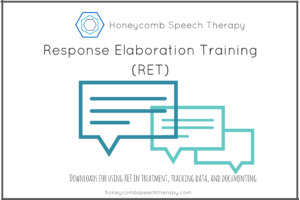If you are like me, you are busy treating patients during the day and can’t absorb a treatment protocol / prep materials / figure out who to use it with / figure out how to word things in documentation… all on your lunch break. It’s difficult to feel confident about using evidence-based treatments AND how to ensure they will be personally-relevant to the patient.
Here’s where the One Click series comes in: This series highlights various treatment protocols that are evidence-based, and I will provide everything you need to implement the therapy in just One Click (or 1 download!). They include a person-centered section to explain how you can use the materials in a person-centered way. If you’ve missed these quick, affordable series in the past, we’ve covered VNeST, CART, Script Training, and Semantic Feature Analysis!
Today we are talking about Response Elaboration Training (RET): See below for the RET protocol, key references, in-session therapy form, and documentation sample.
 *Please note the following are my personal notes from reading the research; key references below if you would like to review them yourself.
*Please note the following are my personal notes from reading the research; key references below if you would like to review them yourself.
Who should I use RET with?
-RET is effective across different types of aphasia
-RET has been effective with mild to severe aphasia cases
-RET has been used with those who also have acquired apraxia, with additional cues (watch me, listen to me, say it with me).
What sort of goals would RET address?
-Improve verbal production in conversation
-increase number of content words in conversation
-improve word retrieval in conversation
-support generalization of expanded utterances across contexts and conversational partners
What does the evidence say I should expect?
-Improvement of responses and conversation
-Generalizes when combined with Semantic Feature Analysis (SFA)
How does RET relate to a person-centered approach?
-This approach is all about creative responses, not about achieving a pre-determined answer. That means a person is more likely to generate the sort of language they will need to use on a regular basis! The modified version also includes using topics relevant to the person (a favorite vacation, how to change a tire, etc.), so the possibilities are endless for customizing this for certain language needs!
I’ve created the Response Elaboration Training Packet for SLPs to start using this in therapy immediately, which includes:
-A cheat sheet for how to do RET
-In-therapy scoring form
-Narrative documentation sample
-20 action pictures to encourage creative responses
-25+ prompts for personally relevant recounts and procedural discourse